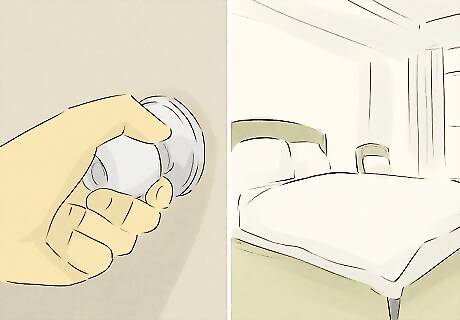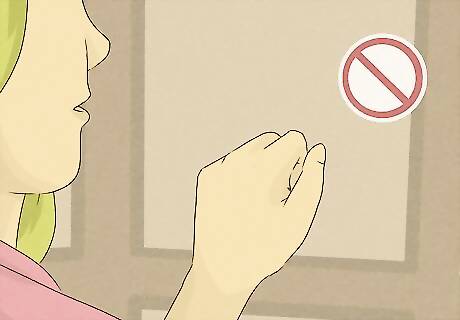
views
Beginning the Conversation

Set aside time to talk to your teen alone. It’s likely that both you and your teen are going to feel awkward talking about masturbation. Having the conversation in your living room after dinner or while out for an evening walk might put you both at ease. Let your teen know that you want to have an important talk with them, but that they aren’t in trouble. Say, “We’re both going to be home on Saturday afternoon, so I want us to sit down for a special talk. Nothing is wrong and you’re not in trouble, so don’t worry.”

Approach your child in a calm, open manner. Keep your body relaxed and avoid crossing your arms, which might send the message that you’re upset. Additionally, use a friendly, understanding tone of voice. This will signal to your child that what they’re doing is normal. Try to keep the conversation light and casual.Tip: If you feel yourself getting tense or upset, take a few deep breaths to help yourself calm down. You might also count to 10.

Be direct about the purpose of your discussion. Tell them you want to talk about masturbation so they know this isn’t a shameful topic. If you feel uncomfortable or think they might, it’s okay to use euphemisms like “touching yourself” or “exploring your body.” You might say, “You’re getting older now, so you may want to start exploring your body. I want to talk about that today so you know what you’re feeling is normal.”

Make it clear that you’re not shaming their behavior. It’s likely that your child is going to feel embarrassed if they've been masturbating. If they feel like you’re shaming them, they may learn to hide their sexuality or may believe that natural urges are wrong. Tell them that you’re only talking to them so they have the right information. Say, “You’re not doing anything wrong. It’s totally normal to want to touch yourself, and I want you to know all of the facts about it.”
Clarifying Facts and Expectations

Explain that masturbation doesn’t have any negative side effects. Your child may have heard rumors about the dangers of masturbation. Tell them that masturbation doesn’t harm their health or damage their body in any way. Let them know that it may actually help them by lowering their stress levels. Finally, ask them about any rumors they’ve heard so you can dispel the myths. Say, “Masturbating is a natural behavior that won’t hurt your body. What have you heard about it?”

Discuss the importance of privacy when it comes to masturbating. While some teens will hide what they’re doing, others may feel open about it. Either way, teach your teen that masturbation is something you do in private. This means using door locks while at home and not doing it in public places. Let your teen know that they don’t need to be ashamed about it. Privacy is about respecting yourself and others, not about hiding your behavior.

Talk to your teen about your personal values, but honor their choices. Explain what you believe about masturbation and sexuality. Then, tell your teen what choices you hope they’ll make. However, let them know that their body is theirs, so you respect their choices. You might say, “I think that masturbation is a safe way to satisfy your sexual urges. I hope you’ll wait to have sex until you’re an adult and know what you want. However, I know you’re a smart kid and respect the choices you feel are right for you.Warning: You may have religious or spiritual beliefs that conflict with masturbating, but it’s important to let your child decide what’s right for them. Tell them how you feel, but don’t shame them into complying with your expectations. Otherwise, they may develop unhealthy sexual habits.

Explain the importance of good hygiene while masturbating. When your teen first starts masturbating, they may not realize the importance of washing their hands or device, if they use one. Talk to them about the importance of keeping their genital area clean to avoid infections. Emphasize that they should always wash their hands before they do it. Tell them to wash their hands before and after masturbating, as well as to wash any toys they use. Explain that using dirty hands or toys might cause a UTI. Teach them to use clean hands and to clean up afterwards.

Share your own experiences only if you feel comfortable. Your teen may ask if you masturbate. It’s up to you if you want to answer. Don’t feel pressured to talk about it if you don’t feel comfortable. You could say, “I started masturbating in middle school, but I don’t do it often now,” or “Many people enjoy masturbating, but some prefer not to do it. However, it’s not something you should ask about.”

Allow your teen to choose whether or not they want to talk. Your teen may have a lot of questions, but they may also want to stay quiet. Let them talk freely if they choose to do so. If they’re staying quiet, let them know that you’re interested in hearing their thoughts but will respect their decision if they don’t want to say anything. If your child opens up or asks questions, you might say, “I’m really proud of you for speaking up. I hope you’ll always come talk to me.” If your child isn’t saying anything, say, “I want you to know that you can tell me anything you need to say, and I’m always ready to answer questions. At the same time, you don’t have to talk if you don’t want to.”
Wrapping Up the Conversation

Answer your teen’s questions to the best of your abilities. Ask your teen if they have any questions. Give them answers as you see fit. If you don’t know an answer, tell them that you’ll check on it and get back to them later that day. For example, they may ask things like, "Will masturbating every day hurt me?" or "Will masturbating make me become infertile?" The answer to both of these questions is "no." Similarly, they might have questions about wet dreams. You can likely find the answer to the question online. You may prefer to do this yourself in case inappropriate material comes up.Tip: Keep in mind that if you wait too long to follow up with an answer, your teen will likely look it up themself. They may also ask their friends, but it’s better that they get answers from you.

Reassure your teen that nothing is wrong with them. Before you end the conversation, reinforce the fact that masturbation is normal and healthy. Tell them that many people enjoy doing it, so they have nothing to be embarrassed about. You might say, "I know what you're going through may be confusing, but you need to know that this is normal and healthy, so you don't need to feel guilty about it."

Ask your teen if there’s anything they need from you. This is a great time to teach your teen that they can come to you when they need help making safe sex decisions. Try to keep an open mind and help your child get what they need to stay safe. Right now, that might mean a box of tissues or a lock on their bedroom door. Say, “Is there anything you need from me?” This will help your teen feel comfortable asking about protection or birth control pills later. While you might hope they don’t need them, it’s better that they’re prepared.Tip: You don’t need to facilitate your child’s sexual behavior. However, it’s important that your teen has the things they need to stay safe. Otherwise, they may engage in unsafe behaviors.

Check in with them 2-3 days later to see if they have questions. Your teen may need to think things over for a few days before they have questions. However, they might feel uncomfortable about bringing up the topic again. Talk to them in private a few days after the big talk to see if they have more questions. You might say, “I’m sure you’ve been thinking about what we discussed on Saturday. Did you think of any questions?”

Avoid snooping on your child to see if they’re masturbating. It’s important that your child has privacy and is able to make decisions about their body. You only want the best for them, but sometimes this means respecting their boundaries. Give your teen space to decide what’s right for them. Don’t go through their things or knock when you suspect they’re masturbating.




















Comments
0 comment